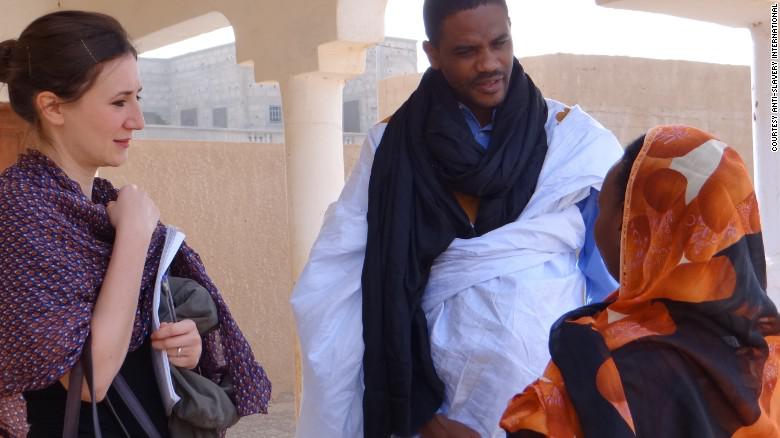
It's a development so encouraging one activist called it "unbelievable."
For only the second time in the country's history, a judge in Mauritania this week convicted two people on charges of slavery, according to anti-slavery activists and U.S. officials.
Slavery is thought to be more common in that West African country, which CNN featured in the 2012 documentary "Slavery's Last Stronghold," than anywhere else on Earth. According to a report from the Walk Free Foundation, an estimated 4% of Mauritanians -- 155,600 people -- live in modern slavery.
"This is a significant development," the U.S. ambassador to Mauritania, Larry Andre, said of the convictions. "It sends a clear message to people who deny freedom to others risk losing their own."
Mauritanian officials long have denied modern slavery exists in the country. This week's convictions provide new evidence not only that slavery continues but that some factions of the government finally are willing to do something it, said Sarah Mathewson, Africa program coordinator for Anti-Slavery International.
"Lots of people (in Mauritania) will be very encouraged by this ruling -- encouraged to leave slavery, encouraged to access justice," she said. "And slave owners will be discouraged from continuing to abuse them."
"It's unbelievable," she said. "It keeps dawning on me."
On Monday a special slavery court in Nema, Mauritania, convicted two people on charges of owning two women as slaves from birth, according to a press release from Anti-Slavery International, which brought the lawsuit with SOS Esclaves, a local anti-slavery group.
"The slave owners convicted yesterday come from a highly influential and powerful family," that London-based organization said in a statement. "A full public hearing was held, with the masters held to account before one of their former slaves."
Court documents for the case were not immediately available.
The U.S. Embassy in Nouakchott, the Mauritanian capital, confirmed the convictions for CNN, saying the slave owners were sentenced to 5 years in prison and a 1 million ouguiya ($2,800) fine. A local official from the U.N. Office of the High Commissioner for Human Rights also confirmed the convictions had taken place.
The men are likely to serve only one year of the sentence, according to Anti-Slavery International.
"One year is a short period of time, of course," said Gulnara Shahinian, the former U.N. special rapporteur on modern slavery, who has visited Mauritania five times. "I understand this. But, again, I take this as an important step. I don't want to be pessimistic."
"We need to all congratulate Mauritania for doing this -- but be very cautious," she said. "It's a beginning. And we have to keep our eye on these processes. The country still needs help in order to address human rights issues in the country."
The convictions mark a hopeful turning point in Mauritania's fight against slavery, Shahinian said.
Some Mauritanians continue to practice a form of slavery reminiscent of the United States before the Civil War. Black Africans largely are enslaved by lighter skinned Arabs, and some people continue to be born into slavery. They spend their lives working at the hands of masters who own them as property.
The two victims in this week's case, who Anti-Slavery International named as Fatimetou Mint Hamdi and Fatimata Mint Zaydih, both in their late 30s or early 40s, escaped slavery with their children last year with the help of SOS Esclaves.
Hamdi participated in the public trial, according to Anti-Slavery International. "When the masters were denying the charges, she began crying out: 'That's not true, you know what we were to you!'" the group said in a news release.
"I herded their goats from a very young age," Zaydih told police, according to excerpted testimony provided to CNN by Anti-Slavery International. "... [S]ometimes my children and I would go for several days without eating. I never received any money or anything else for the work I did. When I went out with the animals for long periods, my children would remain with the larger family of masters. My 10-year old son became the slave of one of the masters, and was under his control all the time."
Last year, Mauritania established special courts for hearing slavery cases. Activists, who had been trying unsuccessfully for years to get slavery cases prosecuted, initially greeted the courts with skepticism. Mauritania only criminalized slavery in 2007, and government officials continue to deny it exists. Before this week, only one conviction on slavery charges had been issued -- and that slave owner never served jail time, according to Mathewson.
But activists now hope these courts could bring about sweeping changes in the country. An additional eight cases now sit before the special slavery courts, according to Shahinian.
"The elements already are in place, but it was necessary to bring all of the elements together to eradicate slavery," said Shahinian, the former U.N. special rapporteur. "This is a very good momentum now."
Activists are urging the government to hear additional slavery cases as soon as possible.
Separately, two Mauritanian anti-slavery activists, Biram Dah Abeid and Brahim Ould Bilal, were released from prison this week after having been arrested for protesting the continued practice of slavery.
After his release, Abeid told Reuters he plans to run for president.
Source: CNN
 FR
FR EN
EN AR
AR








